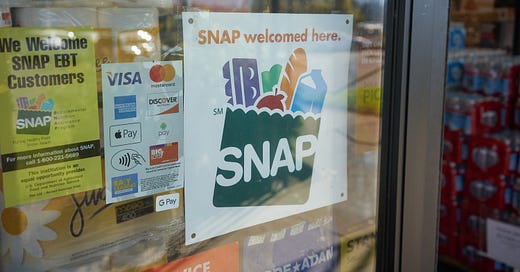Suicidology paper discussed: Associations between income-based nutrition programs and suicidality
Unsurprisingly, reducing starvation and poverty improves the wellbeing of a population
Poverty has long been recognized as a significant social determinant of mental health, with those living in impoverished conditions being at a higher risk for mental health disorders and suicide. Government spending on social safety net programs aimed at supporting low-income individuals can play a crucial role in alleviating the burden of poverty and improving mental health outcomes. One such program is the Supplemental Nutrition Assistance Program (SNAP), which helps provide food purchasing assistance to eligible low-income households, thus addressing food insecurity—a known risk factor for poor mental health and suicidality.
Nutrition is an essential aspect of overall well-being, and it has been found to have a significant impact on mental health. A balanced diet containing sufficient nutrients can promote brain function and reduce the risk of developing mental health disorders, while poor nutrition has been linked to increased risk of depression, anxiety, and other mental health issues. Consequently, government programs like SNAP that aim to improve nutrition and food security among low-income populations may also play an important role in promoting better mental health outcomes.
Food insecurity, affecting approximately 1 in 10 U.S. households and nearly 25 million adults, is consistently linked to poor mental health and suicidality. Experiencing food insecurity can lead to feelings of anxiety, stress, guilt, and shame, which negatively impact mental health and increase the risk for suicidality.
For non-Americans like me, a quick primer: SNAP is the largest U.S. program addressing food insecurity, assisting over 41 million people from more than 21 million low-income households with monthly food cost benefits. Eligibility is based on income and assets, but states can adopt broad-based categorical eligibility (BBCE) policies, allowing them to increase the income limit and eliminate the asset test, potentially making more people eligible for assistance.
The study: Association of State Supplemental Nutrition Assistance Program Eligibility Policies With Adult Mental Health and Suicidality by Austin et al
The study employed data from the SNAP Policy Database, the National Survey on Drug Use and Health (NSDUH) State-Level Small Area Estimates, and the National Vital Statistics System (NVSS). Researchers updated SNAP Policy Database information for 2014 to 2017 and utilized NSDUH state-level estimates for 2015-2016, 2016-2017, 2017-2018, and 2018-2019. They measured state elimination of the asset test for SNAP eligibility, state increases in the income limit for SNAP eligibility, and state adoption of both policies under BBCE. Outcomes were adults with past-year major depressive episodes, mental illness, serious mental illness, and suicidal ideation, and suicide deaths.
State-years with both “SNAP expansion policies” (elimination of the asset test and increased income limit) had slightly lower median percentages of adults with mental health outcomes compared to state-years with neither policy. Specifically, state adoption of both policies was associated with an 8% decrease of past-year major depressive episodes, an 8% decrease of mental illness, a 9% decrease of serious mental illness, and an 11% decrease of suicidal ideation. The rate of suicide death also suggested a 7% decrease in states with both policies, although this result was not statistically significant.
The study's results align with previous research to show that expanded SNAP eligibility and participation are associated with improved mental health outcomes.
The authors note 5 limitations:
Potential underreporting of mental health and suicidal ideation in NSDUH due to sensitivity and stigma.
Possible misclassification of suicide deaths on death certificates.
Study population included all adults, not limited to those eligible for SNAP.
Potential unmeasured confounding despite adjusting for known confounders.
Ecological study, subject to ecological fallacy; doesn't allow for causal inferences at the individual level.
To me, 3 and 5 are the biggest things to keep in mind. I suspect that we may have seen a much larger effect if we looked at the target SNAP population, and of course, the Ecological fallacy always looms large: just because we observe relationships, we cannot ascribe these relationships in a causal way. 4 kind of made me laugh because, um, yes, it’s not potential unmeasured confounding, it’s just a question of how much.
Governments should spend on suffering populations
The growing body of research highlights the crucial role government spending plays in alleviating poverty and improving mental health outcomes among vulnerable populations. When governments invest in social welfare programs and address the underlying causes of suffering, they can significantly impact mental health, reducing instances of depression and even suicide rates.
A study published in The Lancet found that increased government spending on social protection programs during the Great Recession in European countries helped mitigate the unemployment-suicide link. The research analyzed data from 2000 to 2011 in 30 European countries, showing that each $10 increase in social protection spending per capita was associated with a reduction of 0.38 deaths per 100,000 population by suicide. The authors concluded that social protection spending can help protect vulnerable populations from the adverse effects of unemployment on mental health and suicide risk
As we explore the direct connection between government spending and mental well-being, it becomes evident that such investments not only contribute to the financial security of individuals but also foster healthier and more resilient communities.
“Overcoming poverty is not a gesture of charity. It is the protection of a fundamental human right, the right to dignity and a decent life.”
— Nelson Mandela, Speech in Trafalgar Square, February 3, 2005
Citation
Austin AE, Frank M, Shanahan ME, Reyes HLM, Corbie G, Naumann RB. Association of State Supplemental Nutrition Assistance Program Eligibility Policies With Adult Mental Health and Suicidality. JAMA Netw Open. 2023;6(4):e238415. doi:10.1001/jamanetworkopen.2023.8415








